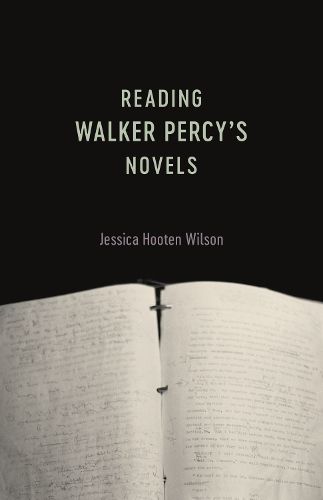Readings Newsletter
Become a Readings Member to make your shopping experience even easier.
Sign in or sign up for free!
You’re not far away from qualifying for FREE standard shipping within Australia
You’ve qualified for FREE standard shipping within Australia
The cart is loading…






This title is printed to order. This book may have been self-published. If so, we cannot guarantee the quality of the content. In the main most books will have gone through the editing process however some may not. We therefore suggest that you be aware of this before ordering this book. If in doubt check either the author or publisher’s details as we are unable to accept any returns unless they are faulty. Please contact us if you have any questions.
Walker Percy (1916- 1990) considered novels the strongest tool with which to popularize great ideas among a broad audience, and, more than half a century after they first appeared in print, his works of fiction continue to fascinate contemporary readers. Despite their lasting appeal, however, Percy’s engaging narratives also contain intellectual elements that demand further explication. Philosophical themes, including existentialism, language acquisition theory, and modern Catholic theology, provide a deeper layer of meaning in Percy’s writings.
Jessica Hooten Wilson’s Reading Walker Percy’s Novels serves as a companion guide for readers who enjoy Percy’s novels but may be less familiar with the works of Sartre, Camus, Kierkegaard, and Dante. In addition to clarifying Percy’s philosophies, Wilson highlights allusions to other writers within his narratives, addresses historical and political contexts, and provides insight into the creation and reception of The Moviegoer, The Last Gentleman, Love in the Ruins, Lancelot, The Second Coming, and The Thanatos Syndrome. An introduction covers aspects of Percy’s biography that influenced his writing, including his deep southern roots, faith, and search for meaning in life. An appendix offers an explanation of Percy’s satirical parody Lost in the Cosmos: The Last Self-Help Book.
Written in an accessible and conversational style, this primer will appeal to everyone who appreciates the nuances of Walker Percy’s fiction.
$9.00 standard shipping within Australia
FREE standard shipping within Australia for orders over $100.00
Express & International shipping calculated at checkout
This title is printed to order. This book may have been self-published. If so, we cannot guarantee the quality of the content. In the main most books will have gone through the editing process however some may not. We therefore suggest that you be aware of this before ordering this book. If in doubt check either the author or publisher’s details as we are unable to accept any returns unless they are faulty. Please contact us if you have any questions.
Walker Percy (1916- 1990) considered novels the strongest tool with which to popularize great ideas among a broad audience, and, more than half a century after they first appeared in print, his works of fiction continue to fascinate contemporary readers. Despite their lasting appeal, however, Percy’s engaging narratives also contain intellectual elements that demand further explication. Philosophical themes, including existentialism, language acquisition theory, and modern Catholic theology, provide a deeper layer of meaning in Percy’s writings.
Jessica Hooten Wilson’s Reading Walker Percy’s Novels serves as a companion guide for readers who enjoy Percy’s novels but may be less familiar with the works of Sartre, Camus, Kierkegaard, and Dante. In addition to clarifying Percy’s philosophies, Wilson highlights allusions to other writers within his narratives, addresses historical and political contexts, and provides insight into the creation and reception of The Moviegoer, The Last Gentleman, Love in the Ruins, Lancelot, The Second Coming, and The Thanatos Syndrome. An introduction covers aspects of Percy’s biography that influenced his writing, including his deep southern roots, faith, and search for meaning in life. An appendix offers an explanation of Percy’s satirical parody Lost in the Cosmos: The Last Self-Help Book.
Written in an accessible and conversational style, this primer will appeal to everyone who appreciates the nuances of Walker Percy’s fiction.